#sunni islam
Text
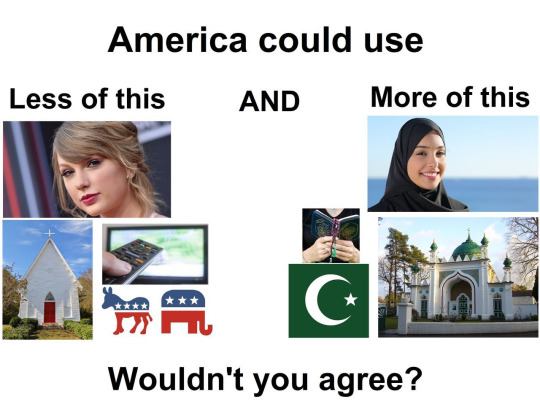
#convert to islam#islam#revert islam#freepalastine🇵🇸#islamophobia#muslim#sunni islam#welcome to islam#all women must veil!#burqa
156 notes
·
View notes
Text

#Hamas#gaza#israel#secular-jew#jewish#judaism#israeli#jerusalem#diaspora#secular jew#secularjew#islam#hamas is isis#iran proxies#iran#Shia Islam#sunni islam#never again#no ceasefire#human shields#judea#Hamas missiles#missiles#gaza war
41 notes
·
View notes
Text

"What Imam Ali Ibn Abu Talib (a) Said on the Occasion of the Burial of the Supreme Lady, Fatima (a), While Addressing the Holy Prophet (s) at His Grave: O Prophet of Allah (s)! Peace be upon you from me and from your daughter who has come to you and who has hastened to meet you. O Prophet of Allah (s), my patience about your chosen (daughter) has been exhausted and my power of endurance has weakened, except that I have ground for consolation in having endured the great hardship and heartrending event of your separation.
"I laid you down in your grave when you breathed your last (as your head was) between my neck and chest. "Verily we are Allah's and verily to Him shall we return" (Holy Quran, 2: 156).
Now, the trust has been returned, and what had been given has been taken back. As to my grief, it knows no bounds, and as to my nights, they will remain sleepless till Allah chooses for me the house in which you are now residing.
Certainly, your daughter will apprise you of the joining together of your umma (people) for the aim of oppressing her. Ask her for the details and get all the news. This has happened only a short period of time had elapsed, yet your remembrance has already disappeared... My Salam be to you both, the Salam of a grief-stricken one, nor a disgusted nor a hateful one. If I go away, it is not because I am weary (of you), and if I stay, it is not due to lack of belief in what Allah has promised those who endure."
-Sermon 202 of Nahj al-balagha.
#Shia#sunni#ahlulbayt#books#history#literature#religion#theology#mysticism#esotericism#religious#shia islam#islam#sunni Islam#lady Fatima#imam ali#islamic theology#islamic tradition#poetry#poem#islamic quotes#quotes#religious aesthetic#religious art#art#islamic art#lana Del Rey#ldr#ldr aesthetic#aesthetic
10 notes
·
View notes
Text
The "by Allah you people are dogs" meme
Listen y'all I'm not a big fan of cancel culture, nor do I believe in the existence of pure "unproblematic" media. But this meme has been bothering me because people seem to quote it without knowing the context. So imma give the some context.
PSA!!** I am not Muslim, I just happen to know a bit more than the average joe about Islam. If someone more knowledgeable pipes in and corrects me, or has something to add, by all means.
So, the man in the cooking video who made this comment is a Sunni Muslim, referring to the Shia Muslims who keep calling in, heckling him as he's cooking. Not a big deal, if they're heckling him then they deserve that comment. Right?
...But right after, he says, and I quote "If there is a real Islamic regime (in Egypt), you people (Shiite Muslims) will not exist anymore. Allah willing."
Then goes on to say; "I lived in Iraq for four and a half years, and these were the best days of my life. Allah's mercy upon Saddam Hussein. He wouldn't let you utter a single word."
...
Context. There is a violent history between Sunni and Shia Muslims. Specifically, the persecution of the Shia minority (~10% of Muslims), by the Sunni majority. And what this Egyptian man is referring to is the period in Iraq during the 1990's when the then prime minister Saddam Hussein quelled and massacred a Shia rebel group. Since then, many, many Shia populated villages in Iraq and elsewhere in the Middle East have been targeted.
Yikes!
Now I'm not saying stop using that meme. Do what you will, it's the internet. But maybe be aware of the context behind those memes. Because since that memes was popularised, the views on clips of this meme have skyrocketed. With comments ranging from "haha he shut down those trolls" to "this man has the right idea".
Just... I'd rather people know the whole story than their take away being "haha funny". Because make no mistake (and I think most Muslims would agree with me), this man's opinions are downright vile and from my understanding, completely against the teachings of the Qur'an and Allah.
Sources:
Meme video clip with English subtitles
News Article about the subject
Thesis on the subject
Wikipedia links that break down the historical context for your ease of understanding; Persecution of Shias by the Islamic State, Anti-Shi'ism, Shia–Sunni relations.
#by allah you people are dogs#meme#problematic#muslim#shia muslim#sunni#sunni islam#tw genocide#Iraq#Egypt#Islam#islamic history
8 notes
·
View notes
Note
What's the difference between sunni and shia?
im not 100% sure if all of this is true, i need @aylin-hijabi to help confirm these n maybe add on !
but i think that the main thing is our views of certain sahaba (companions of the prophet). shia muslims dislike omar bin alkhattab (ra) and they love ali (ra) and his sons, hasan (ra) and husayn (ra) and refer to the three of them as "imam"
im a sunni, so i love all four of them, along with all the other companions, but i dont hold ali (ra), hasan (ra), or husayn (ra) to the same level as shia muslims do
10 notes
·
View notes
Text
youtube
2 notes
·
View notes
Text

Hello, My name is Kenneth! I used to be on Tumblr as a teenager, Now I'm back on Tumblr as an Adult. I wanted to start blogging about my life as an Autistic Muslim. I wasn't always Muslim. I was a Christian for my whole life! Well until I decided Christianity wasn't my cup of tea and left. My momma told me that I could practice any Religion I wanted, As long as I did my research on the faith I was looking into. I'm now a devoted Sunni/Sufi Muslim! I said my shahada October 14th 2022!
4 notes
·
View notes
Text



Combats au Liban en 2007.
12 notes
·
View notes
Text
.. for nothing expels the illusions of this world like a reminder of death.
9 notes
·
View notes
Text
"Not-so-gentle reminder that the GOP isn't "the American Taliban". The Taliban are an extremist form of Sunni Islam. The GOP are not Muslim. They are Christofascist Radicalized Religious Extremists. Stop equating everything bad with middle eastern religions and culture. This is explicitly Christian extremism."



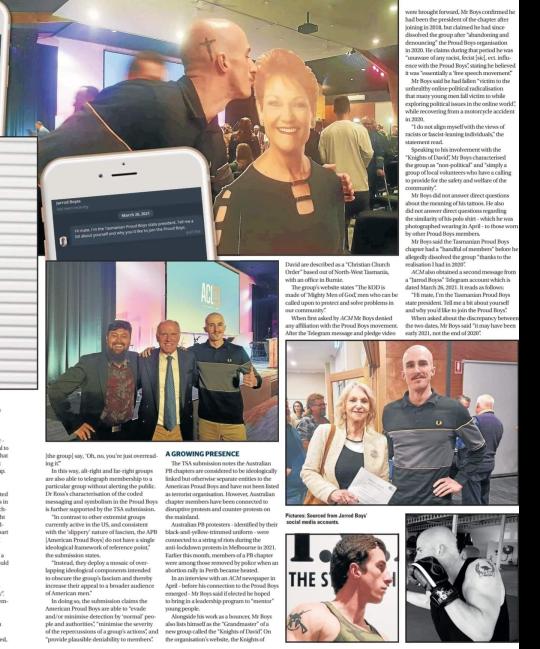






#reminder#healthy reminders#this has been a psa#important psa#just a psa#psa#just fyi#just a general fyi#also fyi#fyi#fuck the gop#michigan gop#gop house#gop patriots#gop#taliban#sunni islam#islam#muslim#christofascists#christofascism#right wing extremism#anti trans extremism#far right extremism#religious extremism#extremist#christian extremism#christianity#christian#religion
1 note
·
View note
Text
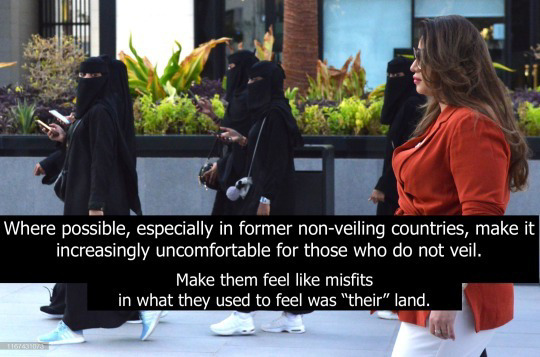
#convert to islam#islam#islamophobia#muslim#revert islam#sunni islam#welcome to islam#freepalastine🇵🇸#burqa#fatwa#all women must veil!#sharia law
167 notes
·
View notes
Text
DAILY CALIPHATE NEWS
If you want to understand what Islam is up to, you need to see what ISLAMIC POLITICAL AND MILITARY LEADERS and their spokespeople (Imams at weekly sermons, sheikhs, Ayatollahs, and the Arab global press), are saying daily in their own language. These headlines scream racism, hate, genocide and encourage daily acts of suicidal jihad of civilians, for the purpose of creating terror and eventually leading to global domination. These are just from yesterday:
Columnist In Qatari Daily: Hatred And Hostility Are Ingrained In The Jews;
Palestinian Author Hassan Hamid: The Israelis Know They Will Leave Palestine;
Lebanese Analyst: Only The Rich Jews Who Practiced Usury Were Burned In The Holocaust
Islamic State Khurasan Province (ISKP) Poster: Shi'ites Of Iran Orchestrated October 7 Hamas Attack;
Michigan Islamic Scholar In 2016: Israel Must Be Annihilated
Trinidad And Tobago Islamic Scholar: Russia Knows October 7 Was Planned By Mossad, Just Like 9/11
ISIS Supporters Eulogize Gazan Who Swore Allegiance To ISIS, Participated In October 7 Attack;
Following US Treasury Designation, 'Gaza Now' Condemns Sanctions As Attempt To 'Silence The Voice Of Wounded Gaza'
Los Angeles Director of Council on American-Islamic Relations (CAIR) Ayloush @ Nov 2023 Islamic Society Of Orange County Event: Israel Should Be Attacked, Has No Right To Defend Itself;
Growing Influence Of Wagner Private Military Company (PMC) In The Central African Republic (CAR);
Under the heading: "You can't Make this Shit Up":
Islamic Scholar Shakir: Trump May Create A Palestinian State If Told He Will Be On Mount Rushmore
#israel#secular-jew#jewish#judaism#israeli#jerusalem#diaspora#secular jew#secularjew#islam#CAIR#council on American-Islamic relations#Isis#taliban#al qaeda#Hamas#hezbollah#Islamic jihad#al-asqa brigades#islamism#caliphate#global caliphate#sunni islam#shia islam#Shi'a#never again#no ceasefire#10-7-23#oct 7 2023
3 notes
·
View notes
Text
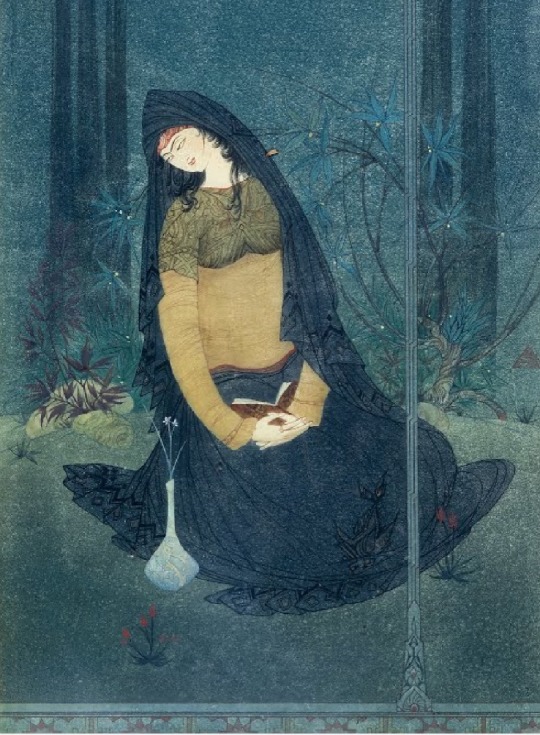
“Allah سُبْحَانَهُ وَتَعَالَىٰ, through an infinite variety of subtle graces and goodness, invited people to Himself, but they did not respond to His call, so He afflicted them with diverse calamities, that by means of this torment they might return to Him, for He loves His creation.”
-Fatima Al-Nisaburiya.
#books#history#literature#religion#theology#mysticism#esotericism#religious#islam#sufi#sunni#sunni Islam#muslim#islamic#haqq#shia islam#Shia#sunnism#sunni Muslim#islamic quotes#sufi quotes#sufism#female mystic#women in history#women in Islam#sufi wisdom#wisdom#knowledge#religious aesthetic#religious art
8 notes
·
View notes
Text
Allah supreme: how Pharoah Sanders found freedom and rebellion in Islam | Pharoah Sanders | The Guardian
The day the music died was 24 September 2022. On that Saturday, the legendary tenor saxophonist Pharoah Sanders, a man who blew his horn “as if he was a dragon breathing fire”, passed on, at age 81. With his death came the end of a majestic era, a time of saxophone spirituality and musical mysticism that will probably never be surpassed or even replicated. Sanders, like so many of his generation, channeled spirit into song, drawing inspiration from a panoply of sacred sources.
For a while, younger hip-hop generations also found words and meaning in a similar kind of search, and the music –along with the quest – continued.
But jazz has changed and hip-hop has changed.

Never mind that only some of these artists adopted the faith itself. It was their notes and their tones that counted. Plaintive, modal, quarter-toned and chromatic, these aural landscapes of east and west and everything in between stretched the imaginations of both players and audiences. Inside the music, new alliances were forged between people and with all that was holy.
To some people, though, the music just seemed cacophonous and angry. White critics often didn’t understand. Even as astute a thinker as the English Marxist historian Eric Hobsbawm wrote, in 1959, that jazz’s “flight into Mohammedanism or some other non-white culture” was a way to “sidestep” a rising avant-garde jazz that was seeking white acceptance. Describing the era, Hobsbawm explained that “the marvelous political awakening of all the oppressed and underprivileged in Roosevelt’s America put a new tone into the jazz musician’s instrument: open resentment”.
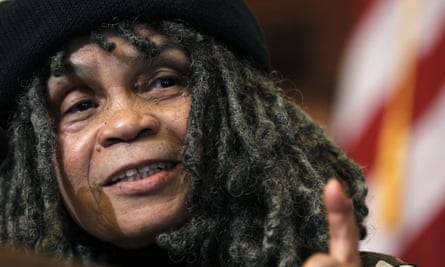
If all you heard during the long civil rights era was an endless blow of rage, you were missing out since you weren’t listening. The love was everywhere and all over the music. The piano player Ahmad Jamal told an interviewer: “I get my approach to life from the Holy Qur’an. I belong to the Ahmadiyya movement in Islam. Our motto is, ‘Love for all; hatred for none.’” (Many of the jazz musicians of that era came to Islam through the Ahmadiyya movement, a religious revivalist movement that began in late 19th-century India. It was led by Mirza Ghulam Ahmad, a charismatic reformer who believed he had received divine revelations that required him to promote the unity of all religions as manifest through Islam. Ahmadis came to the USA in the 1920s and found receptive audiences in African American communities.)
And it was a love supreme. I’ve argued elsewhere that Coltrane’s most famous song, A Love Supreme, has its own Islamic echoes (the chant “a love supreme” starts to sound a bit like “Allah supreme” after a while). Pharoah Sanders, who played with ’Trane starting in 1965, extended Coltrane’s legacy after his death in 1967.
Meanwhile, Sanders continued to build his own spiritually inflected, religious ecumenical style. His 1969 hypnotic track Hum-Allah-Hum-Allah-Hum-Allah meditates on the words “Prince of peace / Won’t you hear our pleas / And ring your bells of peace / Let loving never cease” for an enveloping and achingly beautiful 15 minutes. His classic The Creator Has a Master Plan had its own second coming when it was re-released in a trip-hop remix in the mid-90s. The Trance of Seven Colors, Pharoah’s work with the master Gnawa musician of Morocco Mahmoud Guinia is simply transcendent on an interstellar plane.
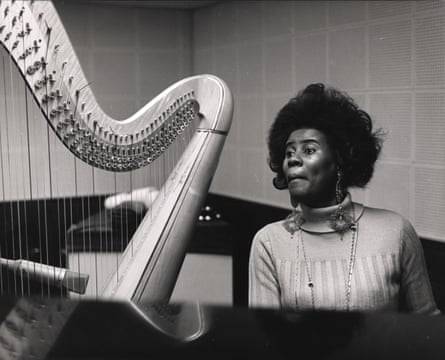
And it was a way of connecting to Africa. “The Christianity of the slave represented a movement away from Africa,” Amiri Baraka wrote in this classic text Blues People. “It was the beginning of Africa as ‘a foreign place’.” For the jazz musicians of this long and spiritual era, to reconnect with Africa was more than idle curiosity. It was a way of suturing back an essential part of you that had been forcibly torn from your collective body generations ago. By the mid-1950s and 1960s, African-themed events at nightclubs and restaurants in Brooklyn and Harlem abounded, with UN diplomats from newly independent African countries frequently dropping in. The jazz pianist and composer Randy Weston described the era: “Many of the African countries were just getting their independence. And the wonderful thing about being in New York, the United Nations is there. So I had an opportunity to meet many African diplomats. Many people from Kenya, from Nigeria, from Ghana, from Egypt, many parts of Africa. And I would always talk to them to try to understand a little more about the continent.”
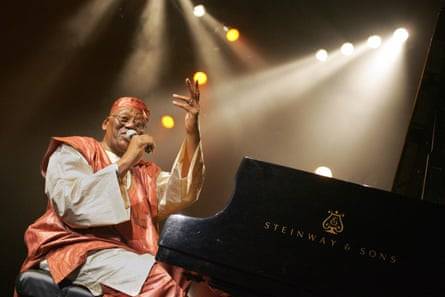
Weston eventually relocated to Morocco for about five years and traveled throughout the African continent before returning to the USA in 1972. “I went on a spiritual trip back home,” he told DownBeat magazine in 1998, referring to Africa. “I wanted to hear where I came from, why I play like I play, why we play music like we do. We went to about 18 countries, and wherever we went we asked to experience the traditional music of the people. Hearing the traditional music was like hearing jazz and blues and the Black church all at the same time.”
Weston also joined forces with master Gnawa musicians in Morocco. (He was playing with them and learning from them before Sanders did the same.) Others, such as Alice Coltrane, were moving in more eastern directions while still others, like Sun Ra, lived in intergalactic space and called us all to move in with him.
The spiritual jazz movement continued, but it didn’t take long for it to be eclipsed by other trends, everything from commercially accessible fusion, launched by the likes of Miles Davis, to the less accessible avant-garde innovations of Cecil Taylor or Albert Ayler. By the 1990s, jazz was also firmly ensconced in the ivory tower, featuring at prestigious arts institutions such as Lincoln Center and the Kennedy Center.
Still, the Islamic influence in American popular music never went away, though it did change addresses. Shifting from sound to word, Muslim references could now be found more in the new hip-hop than in the new jazz, even if hip-hop Islam was a yet more heterodox creed than the one found within the Ahmadiyya community. Foundational hip-hop artists including Rakim, Big Daddy Kane, and the Wu-Tang Clan were invoking the words and numbers of the Nation of Gods and Earths, an offshoot of the Nation of Islam.

Five Percenter language has permeated the pop cultural lexicon. For example, the “G” in “wassup, G?”is not “gangsta”, as many might think, but “God”. In this creed, Five Percenter men are considered Gods, and Five Percenter women are known as Earths. “Dropping science” is a term from the Five Percenters, as is the emphatic term “word”, a short form of “word is my bond”.
Scholars have written on the important influence of Five Percenters on early hip-hop. But there are also other, more mainline Muslim influences on the American scene. Five Percenter doctrine was foundational in hip-hop, but it operated as an esoteric language among the educated and enlightened. The way the language and numerology (with an emphasis on the number 7) operated was to signify kinship and belonging, which was particularly important in the early hip-hop years. But other Muslim rappers, often associated with Sunni Islam, performed their deen, their faith, more in line with the jazz tradition that preceded it, as a search for self.

Mos Def is hardly the only one who invokes this devotional search. A Tribe Called Quest’s Q-Tip (Kamaal Fareed) is another. “Praise the Lord of the worlds that’s unseen / Respect me for that and let me do my thing,” we hear in the song Get a Hold. More recently, the Five Percenters, the Nation of Islam, and Sunni Islam (and more) tentatively unite to find a home in the lyrical power of Jay Electronica. “All I have in this world is my flag and my sword / I’m on the battlefield with the flag of my Lord,” rhymes Electronica in Fruit of the Spirit. “My shahada is my cantada / My heart chakra light up when I make sajda at fajr.”
While spiritual quests such as Jay Electronica’s aren’t as common in today’s hip-hop, the search hasn’t disappeared entirely. After all, the history of Black music shows us time and again how the journey seeking the divine produces such a profound musical experience.
And that’s what Pharoah Sanders leaves behind. His was an unyielding search for a way to transcend the secular ugliness of this world, and with his passing Sanders may have finally achieved that goal. Yet music – like all that is holy – never dies. And Pharoah’s saxophone will honk and shriek and envelop all our senses, reverberating to heaven and back, and maybe even beyond.
#Islam#Pharoah Sanders#how Pharoah Sanders found freedom and rebellion in Islam#Nation of Islam#5% Nation of Islam#Sunni Islam#Five Percenters#jay electronica#mos def#rakim big daddy kane#John Coltrane#St John Coltrane#Alice Coltrane
3 notes
·
View notes
Note
You mentioned that you and Aylin are a part of two different Islamic sects, are there others?
its hard to say for sure
the difference between me and aylin largely lies w our opinions on certain people from the sahaba (the companions on the prophet). thats the main divide between shia and sunni (aylin correct me if im wrong). we are largely the same in terms of like, what we believe in and stuff like that. we both love allah and muhammad pbuh, we both love all the prophets that came before (moses, jesus, abraham, etc).
sunni-shia is the biggest divide w muslims, however, not all of us are the same. there are a couple things that are somewhat controversial in islam (e.g. is music allowed, are dogs considered impure, eating of certain animals, etc) so we have schools of thought that we follow.
this isnt as much of a divide. for example, my friend follows the shafi'i school of thought which says music is loathsome but somewhat tolerated, whereas the school of thought i follow (the maliki) says that its fully prohibited
its just the little things
6 notes
·
View notes